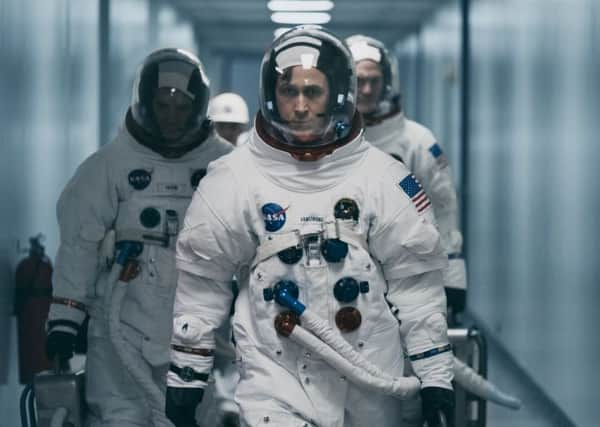Film reviews: First Man | 22 July | Mandy | Bad Times at the El Royale


First Man (12A) ****
22 July (15) ****
Mandy (18) ***
Bad Times at the El Royale (15) **
If it seems strange that nobody has made a film about the first man to set foot on the moon until now, Damien Chazelle’s appropriately titled biopic of Neil Armstrong offers a pretty good reason why. For all the potential patriotic fervour the story of America’s victory in the space race offers, First Man sets itself the more noble and difficult task of grappling with an introverted hero whose stoicism, humility, decency and quiet intelligence (at one point in the film he’s mockingly dismissed as “another egghead”) are at odds with the sort of charmingly reckless and maverick behaviour beloved by movies about great adventurers.
As Chazelle’s film has it, Armstrong’s introspection was in place long before NASA selected him to command Apollo 11 – and it was intensified by the never-articulated grief he felt over the tragic death of his infant daughter, Karen, just as he was being recruited for the space programme.
Advertisement
Hide AdWe see those events conflated in the opening scenes of First Man as Ryan Gosling, re-teaming with his La La Land director to play Armstrong, pushes at the edges of the Earth’s atmosphere in a dangerous test flight before tending to Karen as the prognosis for her recovery from a brain tumour worsens. The durability and fragility of human life implicit in these images is explored repeatedly in the ensuing film, which tracks the progress of Armstrong over the next eight years, right up to, and slightly beyond, the lunar landing. But this theme is reflected too in the way Chazelle shoots the film, deploying grainy, scaled-down visuals more redolent of its 1960s setting, the lack of pizazz in-keeping with the precarious nature of the technology involved in this particular feat of human ingenuity. As such, he largely avoids the sweeping sci-fi vistas we’re used to seeing in movies like 2001: A Space Odyssey, Gravity and Interstellar, choosing instead to keep his camera tightly trained on Gosling to launch us ever deeper into Armstrong’s headspace.
That can make the film (and Armstrong) seem emotionally stilted, especially as we see the toll it’s taking on his wife, Janet (she’s played by Clare Foy, who does a lot with a thankless worried-spouse role). Yet the payoff when we arrive on the moon is worth it, not just for the way it shows the enormity of the mission subtly transforming Armstrong, but also for its ability to turn such a historic moment into an existential one by eschewing nationalistic jingoism and downplaying triumphalism. Chazelle’s decision to hold off using JFK’s inspirational moonshot speech until the end is also a smart one. Filtering it through Armstrong’s bemused eyes upon his return to Earth, it’s a scene loaded with dramatic irony, a reminder that for all the hope and wonder and positivity this achievement represented, everything the mission embodied can easily be undone.
After the creatively redundant Jason Bourne, Paul Greengrass makes a welcome return to his docudrama roots with 22 July, an intense, clear-eyed and even-handed reconstruction of the 2011 Norwegian terror attacks in which rightwing extremist Anders Breivik bombed a government building in Oslo then massacred a group of teenagers attending a summer camp on the nearby island of Utøya. The film’s recreation of the massacre is raw and upsetting and, somewhat mercifully, dispensed with relatively swiftly. Thenceforth Greengrass spends the remainder of the film focusing on the fall-out and subsequent trial, particularly the way Breivik (played by Anders Danielsen Lie), tried to turn it into a platform for his racist, anti-immigrant, Nazi-inspired beliefs. Like Greengrass’s masterful United 93, it’s a film that uses recent history to ask questions about the political direction the world is heading in. The conclusions it reaches are distressing to say the least.
Midway through Mandy, a warped, psychedelic, 1980s-set revenge movie that plays like an adult spin on Stranger Things, Nicolas Cage retrieves a shotgun-cum-crossbow from an old acquaintance (1980s action staple Bill Duke) and gleefully announces he needs it for “hunting Jesus freaks”. In an earlier hallucinogenic rampage, said freaks killed his wife, the eponymous Mandy (Andrea Riseborough), and Cage’s Red means to exact bloody vengeance. Hence the shotgun-cum-crossbow. And hence the massive, hand-forged silver axe (not to mention the chainsaw) that he subsequently lays his hands on as
he tracks down Linus Roache’s demon-summoning cult leader and his LSD-fried followers. All of which sounds like manna from heaven if you’re a dedicated Cage fan. And yet, as enjoyable as Cage is here, the studied weirdness of Panos Cosmatos’s sophomore feature (his little-seen 2010 debut Beyond the Black Rainbow is similarly wigged-out) is often as trying as it is transcendent.
Still, it’s better than fellow cult wannabe Bad Times at the El Royale, which has all the indulgence of a late-period Tarantino film and none of the depth. Directed by Drew Goddard (Cabin in the Woods), it’s a depressingly tedious, very theatrical slice of try-hard pulp fiction, set against the backdrop of a Manson-style massacre, and featuring a cast of big-hitters (Jeff Bridges, Jon Hamm, Chris Hemsworth, Dakota Johnson) spouting over-written dialogue while various violent acts reveal the true identities of the myriad patrons of the titular Nevada hotel. Though individual scenes are quite stylishly done, Goddard overestimates the cleverness of the twists and the film buckles under the weight of its needlessly prolonged 140-minute running time. ■